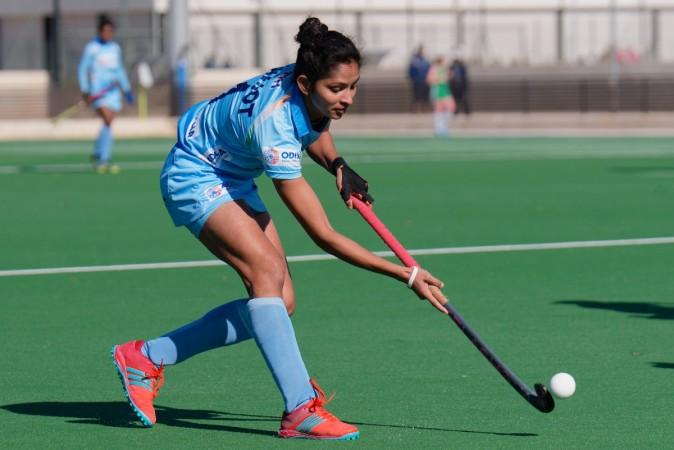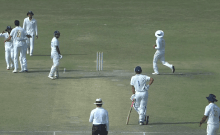
Indian women's hockey team will face United States of America in the Olympic qualifiers set to take place in Bhubaneswar. In recent times, Indian team's forward line has emerged as a very formidable force and has propelled their team to many high-scoring victories.
One of the key members of the attacking unit is Navjot Kaur. Along with the likes of captain Rani, Lalremsiami and Vandana Katariya, she will present a very tough challenge to the American defence.
In an exclusive interview with International Business Times, India, Navjot talked about her role as an attacker as well as the surge of confidence that the team has experienced in the last couple of years. She also narrates her own journey to becoming a hockey player and the role played by her father in it.
Currently, India's forward line looks quite good. Do you consider that your team's biggest strength?
Navjot: Definitely, our forward line is our team's biggest strength. To be honest, all three parts of our team – defence, midfield and attackers – have improved a lot. But you can look at the scores of our recent matches and tournaments. They show that our forward line has improved a lot along with the entire team.

What are your coach's expectations from you? Does he want you to constantly attack or also focus on your role as the first line of defence?
Navjot: Yes, he tells us when we go for scoring, it's not like if we make two attempts, we will get two goals. The main object is to go into the 'D' and remain calm. After that, if we lose the ball, we are the first line of defence. The defence begins with us. If we take it easy, the ball will go into our half easily.
So, that's what our coach's main focus is: As soon as we lose the ball, we have to go into the defensive mode.
When you go into the D, what is your instinct, to score a goal or get a penalty corner?
Navjot: It depends completely on the situation. If we feel that we can take a free shot, then, of course, we go for the shot on goal. But if we find the area very crowded, then we try and get a penalty corner. In all situations, we keep both options open.
Currently, Lalremsiami plays as the centre-forward. What is your favourite position in the forward line?
Navjot: I don't have a favourite position. Since we are strikers, when we attack, somebody would take the right forward position, somebody would take the left forward, and somebody else would be in centre-forward. The designated positions are just meant to structure the team at the beginning of the game. Otherwise, all the forwards can play at any position in the frontline without any difficulty.

It has been said over the years that Indian players instinctively want to run with the ball and attempt to dodge defenders. Are you expected to focus more on passing the ball quickly rather than running with it?
Navjot: This was the situation two years back when we were too keen on dribbling. Nowadays, since our team has improved a lot, our main focus is that, if there is space, we should dribble or try to get into a one-on-one contest. Otherwise, if we have that option, we go for the pass. It's similar to being in the D, we keep both options with us.
How is your equation with the coach Sjoerd Marijne? He was with the team earlier as well, then briefly went away to men's team, then came back.
Navjot: We can't say anything about the coaches as they keep coming and going. Our team is the same today as it was earlier. That's because the game remains the same. Whoever is the coach, he would talk about having the same structure and same positions.
So, there has been no issue with the coaches, those who were here earlier and those who are now. The only difference is that the Indian coaches speak in Hindi while our current coach speaks in English.
When Lalremsiami first came into the team, she couldn't speak English or Hindi. Did that create problems of communication?
Navjot: Hockey doesn't have any language. It was easy for her as she knew where to play and where not to play. Otherwise, it was a little difficult when we used to try and talk to her or discuss things. That used to cause us a little bit of difficulty.

But day-by-day, she learned the language quite quickly. Our captain was her roommate, so she has helped her a lot. She taught her how to communicate.
Of all the teams that you have played, whose defence have you found the most difficult to penetrate?
Navjot: If I tell you the truth, currently, our attacking unit is very good. We can't say that we don't face any difficulty because all teams want to play well. But our forward line is very good. So, I can't say that one team is most difficult.
Currently, the best team in the world is Netherlands in women's hockey. How much difficulty did you face in getting through their defence?
Navjot: We last played them around two years back. Since then, we haven't played them. Presently, I believe that if we play them now, we will perform better than last time. That's because we have improved a lot. I know I am repeating the same thing over and over again but it's true.
Earlier, we used to feel that teams like Netherlands, Australia, etc. are tough sides. But now, we don't feel like "Oh my God, this is the team we are playing! What will we do?" But seriously, we have worked a lot on various areas of our game. We have improved in things like penalty corner defence and penalty corner attack. So, it's not as if we are thinking, "If Netherland team plays us, how we will perform?"

Tell us about yourself. How did you get into hockey?
Navjot: It was my father's dream that I should play hockey. That's how I got started. Hockey was played in my school, that's where I began playing the sport, when I was in sixth standard.
When did you move to the next level and got selected for senior teams?
Navjot: I was playing in the national-level events till I was in 8th or 10th standard. My participation was in tournaments like national school competitions and junior national competition. When I did my 10+2, I got selected for the national junior camp.
We went on our first tour to Bangkok, for the under-19 Asia Cup in 2011. It was my first tour and we won bronze medal. I was judged the best forward there. That was the beginning of my journey to the Indian team.
You said it was your father's dream to see you as a hockey player. So, did he tell you right from the childhood that you should choose this sport?
Navjot: No, absolutely not. As I child, if anyone did anything to me, I would start crying. I was also slightly irritable and obstinate. He used to wonder what will become of me. So, in my school, howsoever it was, he got me started. You never know what is going to happen. But it was his dream that at least one of his children (we are three siblings and I am the eldest ) should go into sports.
You are the only one who went into hockey, not anyone else?
Navjot: Yes, I am the only hockey player among us. The other two are studying.

So, since you have become a hockey player, are your parents more partial towards you?
Navjot: (Chuckles) Yes, I guess, it is like that. Also because I help my parents in a lot of things. So, they do become slightly partial towards me. My brother and sister are still very young, so they also feel that their elder sister is getting more support from their parents. We try to tell them that it's not like that. But, yes, somewhere the parents are a bit partial towards me.
Finally, what do you think would be the biggest challenge in the Olympic qualifiers?
Navjot: When we play in front of the home crowd, we won't think like "Oh my God, there is so much pressure on us due to the home crowd" and such things. It won't be like that because we have many experienced players in the team who have played on home grounds.
They help our other teammates understand how to face the pressure of home crowd. That's what we have worked on. Also, how can we keep ourselves calm in the middle of the home crowd and play easily?
Lastly, are you comfortable with the new system of penalty shoot-outs which involves a one-on-one battle with the goalkeeper?
Navjot: Yes, because we continuously practice that skill in our training sessions. Our coaches make us practice while putting a lot of pressure by pushing us to imagine that it is a packed stadium and this is our last chance to win. We practice under this kind of pressure. So, when such a situation actually arises, it is easier for us to deal with it as we know how to face it.






![Ultrahuman launches Ring PRO, free charging case with more than just power and Jade AI [details]](https://data1.ibtimes.co.in/en/full/829151/ultrahuman-launches-ring-pro-free-charging-case-more-just-power-jade-ai-details.png?w=220&h=138)









